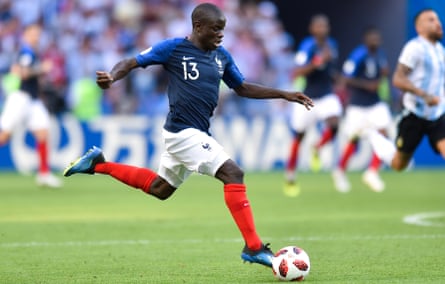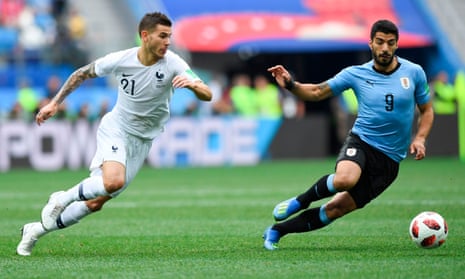Much of the discussion in France this summer has been about how Didier Deschamps can squeeze all of his attacking talent into an effective unit. In his attempts to bring the best out of his forwards, the manager has drifted from a 4-4-2 to a 4-3-3 to a diamond, before arriving back at an asymmetrical 4-4-2. All the while, France’s most consistent players have not been Antoine Griezmann, Olivier Giroud or even Kylian Mbappé, but their defenders. A resolute, physical display from the back four helped the team overcome a dogged – if Edinson Cavani-less – Uruguay. France will look to Mbappé and Griezmann to score the goals that take them past Belgium and into the final, but the team’s defence is fast becoming the real star of the show.
Didier Deschamps’ backline looked very different a year ago. Benjamin Mendy and Djibril Sidibé started at full-back in their three games last June – a 5-0 thrashing of Paraguay, a tough World Cup qualifier against Sweden and a 3-2 win over England where they played with 10 men for 45 minutes. Having proved crucial to Monaco in their glorious run to the Ligue 1 title, Mendy and Sidibé looked likely to take the full-back positions for France for the foreseeable future. The width, balance and crossing ability they provided was seemingly crucial to Deschamps’ plans.
Deschamps’ centre-back slots seemed a little less certain. Had Laurent Koscielny not ruptured his Achilles tendon while playing for Arsenal against Atlético Madrid in May, that might still be the case. Koscielny was seen as an important player who could keep a potentially combustible squad united. He was also the only centre-back in the squad who played in all three of those matches last June.
With Koscielny injured and both Mendy and Sidibé lacking fitness, Deschamps has gone with a back four of Benjamin Pavard, Samuel Umtiti, Raphaël Varane and Lucas Hernández at the World Cup. While Mendy and Sidibé are very attack-minded, their replacements are at the other end of the spectrum. As versatile and natural defenders, they have provided the team with a more compact, bullish and combative rearguard.
Staying true to his schooling at Atleti under Diego Simeone, Hernández has scrapped and niggled his way through the World Cup, winning few friends but remaining undeniably effective and among France’s most consistent players. Pavard meanwhile, having looked nervous against Australia, has grown into the tournament. He is showing a defensive intelligence that blossomed as part of a Stuttgart back three during an impressive top half-finish upon their return to the Bundesliga. His wonderstrike against Argentina remains a leading contender for goal of the tournament.

Umtiti has been promoted to the first XI in place of Koscielny and his physicality has made France’s defence even more imposing. They dealt with an admittedly weakened Uruguay attack comfortably on Friday. Varane in particular proved invaluable. His deft glancing header gave France the lead and his pace and intelligence helped prevent Luis Suárez from having a single shot all game. He did not even have a touch in the France box.
The 2-0 win over Uruguay was France’s third clean sheet in their five games so far. The only goal they conceded in the group stage was Mile Jedinak’s penalty for Australia in the opening game and two of the three goals they conceded in the 4-3 win over Argentina were almost unpreventable – Lionel Messi’s deflected shot and Ángel Di María’s screamer.
Much of the credit for Deschamps’ frugal defence must go to the midfield. N’Golo Kanté has been France’s premier performer and perhaps even the player of the tournament. His characteristically understated performances may not be showy enough to win the golden ball, but his dominance of games is respected back home. On Saturday L’Équipe sang: “Les Bleus can congratulate themselves every day for having him with them.”
Kanté’s dynamism, assuredness in possession and ability to nullify attacks before they become dangerous is crucial to this team. He glues together a midfield that has evolved into a somewhat jagged, if effective, set-up where Mbappé is given far more freedom on the right flank than Blaise Matuidi or Corentin Tolisso are afforded on the left. Without Kanté, France may not have come this far.

France’s attacking trident remains a little flat-footed. Mbappé’s put in an explosive display against Argentina, but maintaining such a high level over 90 minutes remains a skill the precociously talented 19-year-old is yet to master consistently. Griezmann has three goals so far – two penalties and a goalkeeping error – but he looks fatigued and is yet to light up this tournament like he did in the latter stages of Euro 2016.
Similarly, Olivier Giroud is a crucial focal point for the team who creates space for his colleagues, but he is a little on the fringes and is yet to score. This may be something of an omen for France. Bernard Lacombe and Stephane Guivarc’h played similarly supporting roles and neither of them scored when France won tournaments in 1984 and 1998, respectively.
Blaise Matuidi and Paul Pogba have had quietly effective tournaments, complementing Kanté with their own midfield intelligence, mobility and ability on the ball. Even Hugo Lloris has proved stronger than expected, producing perhaps the save of the tournament when he spectacularly denied Uruguay defender Martin Caceres in the quarter-final.
With the World Cup already 28 teams down, France might just be the favourites from among the final four. If they are to squeeze past Belgium on Tuesday night and see off England or Croatia on Sunday, Deschamps may rely on less heralded components of his squad: his belligerent, combative, street-fighting defence. With France carefully navigating their way through the tournament so far, it might be the pragmatic ruthlessness of Hernández and Kanté rather than the flair of Mbappé and Griezmann that takes them all the way.

Comments (…)
Sign in or create your Guardian account to join the discussion